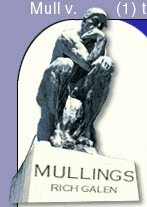Presented
By


Keep up with the latest adventures of Mullings-in-India!

Currying Favor: A Trip to India - Chapter 1
Currying Favor: A Trip to India - Chapter 2
Currying Favor: A Trip to India - Chapter 3
Currying Favor: A Trip to India - Chapter 4
Currying Favor: A Trip to India - Chapter 5
Currying Favor: A Trip to India - Chapter 6
A Memorial Day
Tuesday May 29, 2001
- TITLE: "A Memorial Day" In 1865, Henry C. Welles, a druggist in the village of Waterloo, NY, mentioned at a social gathering that honor should be shown to the patriotic dead of the Civil War by decorating their graves.
Hence the original name of Memorial Day was "Decoration Day."

- When did Decoration Day become Memorial Day? According to the Information Please Almanac:
Decoration Day became Memorial Day in 1868, when it was officially proclaimed a holiday by Gen. John Logan, national commander of the Grand Army of the Republic to honor those that died in the Civil War. The holiday, which was created in Waterloo, N.Y. three years earlier, was known by the name Decoration Day up until that point. It became a holiday honoring veterans of all U.S. wars after World War I.
The last Monday in May was designated a U.S. federal holiday in 1971.
- " � flags �" Here is an undated photo of a soldier Decorating the graves at Arlington National Cemetery

- "� taps �" Here is a history of this bugle call:

Of all the military bugle calls, none is so easily recognized or more apt to render emotion than Taps. Up to the Civil War, the traditional call at day's end was a tune, borrowed from the French, called Lights Out. In July of 1862, in the aftermath of the bloody Seven Days battles, hard on the loss of 600 men and wounded himself, Union General Daniel Adams Butterfield called the brigade bugler to his tent. He thought "Lights Out" was too formal and he wished to honor his men. Oliver Wilcox Norton, the bugler, tells the story, "...showing me some notes on a staff written in pencil on the back of an envelope, (he) asked me to sound them on my bugle. I did this several times, playing the music as written. He changed it somewhat, lengthening some notes and shortening others, but retaining the melody as he first gave it to me. After getting it to his satisfaction, he directed me to sound that call for Taps thereafter in place of the regulation call.
The music was beautiful on that still summer night and was heard far beyond the limits of our Brigade. The next day I was visited by several buglers from neighboring Brigades, asking for copies of the music which I gladly furnished. The call was gradually taken up through the Army of the Potomac."
This more emotive and powerful Taps was soon adopted throughout the military. In 1874 It was officially recognized by the U.S. Army. It became standard at military funeral ceremonies in 1891. There is something singularly beautiful and appropriate in the music of this wonderful call. Its strains are melancholy, yet full of rest and peace. Its echoes linger in the heart long after its tones have ceased to vibrate in the air.
- from an article by Master Sergeant Jari A Villanueva, USAF
- Mullings' Catchy Caption of the Day:

The Amphitheater
Photo: REUTERS/Hyungwon Kang
____________________________________________________________________________________
Home | Current Issue | Past Issues | Email Rich | Rich Who?
Copyright �2001 Richard A. Galen | Site design by Campaign Solutions.
|









